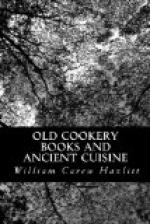The most extraordinary display of fish at table on a single occasion took place at the enthronement feast of Archbishop Warham in 1504; it occurred on a fast day; and consequently no meat, poultry or game was included in the menu, but ample compensation was found in the lavish assortment of confectionery, spices, beer and wine. Of wine of various vintages there were upwards of 12 pipes, and of ale and beer, thirty tuns, including four of London and six of Kentish ale.
The narratives which have descended to us of the prodigious banquets given on special occasions by our early kings, prelates and nobles, are apt to inspire the general reader with an admiration of the splendid hospitality of bygone times. But, as I have already suggested, these festivities were occasional and at long intervals, and during the intervening space the great ones and the small ones of mediaeval and early England did not indulge in this riotous sort of living, but “kept secret house,” as it was called, both after their own fashion. The extremes of prodigality and squalor were more strongly marked among the poorer classes while this country was in a semi-barbarous condition, and even the aristocracy by no means maintained the same domestic state throughout the year as their modern representatives. There are not those ostentatious displays of wealth and generosity, which used to signalise certain political events, such as the coronation of a monarch or the enthronement of a primate; the mode of living has grown more uniform and consistent, since between the vilain and his lord has interposed himself the middle-class Englishman, with a hand held out to either.
A few may not spend so much, but as a people we spend more on our table. A good dinner to a shepherd or a porter was formerly more than a nine days’ wonder; it was like a beacon seen through a mist. But now he is better fed, clothed and housed than the bold baron, whose serf he would have been in the good old days; and the bold baron, on his part, no longer keeps secret house unless he chooses, and observes, if a more monotonous, a more secure and comfortable tenor of life. This change is of course due to a cause which lies very near the surface—to the gradual effacement of the deeply-cut separating lines between the orders of society, and the stealthy uprise of the class, which is fast gathering all power into its own hands.
COOKERY BOOKS
PART 1.
The first attempt to illustrate this branch of the art must have been made by Alexander Neckam in the twelfth century; at least I am not aware of any older treatise in which the furniture and apparatus of a kitchen are set forth.




